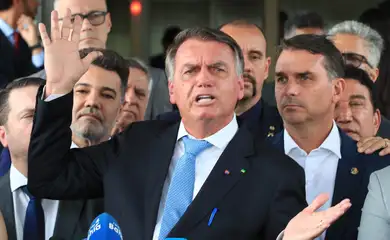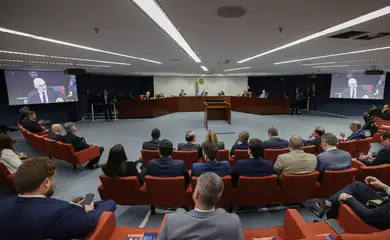Demonstrators across Brazil protest against amnesty for coup plotters

Demonstrators came together in several Brazilian cities on Sunday (Mar. 30) to protest against amnesty for the people involved in the attempted coup of January 8. The largest gathering was seen in São Paulo, where participants called for punishment for those who took part in the depredation of government buildings in January 2023 and for the political group behind it—starting with former President Jair Bolsonaro.

The protests were called by trade union organizations, such as the Unified Workers’ Central (CUT) and the General Workers’ Union (UGT), and collectives such as the Homeless Workers’ Movement (MTST) and the Landless Rural Workers’ Movement (MST).
In São Paulo, the demonstration began on Paulista avenue, the city’s financial center, and went through the Vila Mariana district all the way to the building of the former Information Operations Detachment – Internal Defense Operations Center (Doi-Codi), where opponents of the military dictatorship initiated in 1964 were arrested and tortured.
The rallies also highlighted the role of defending democracy and remembering how the last dictatorship silenced the voices of Brazilian citizens. One of the demonstrators, Lenir Correia, said that the amnesty for the January 8 riots would come as a carte blanche for future coup attempts. “We are here against injustice. [Bolsonaro] was a person who acted against Brazil,” she affirmed.
“They smashed the whole Congress building and vandalized it. They did what they did. This is about defending everything that’s public, everything that’s ours,” she added. In her view, this kind of protest serves to increase the number of people against amnesty and against riots of that kind.
Rosemeire Amadeu, another protester, agrees that amnesty could only usher in new coup attempts.
Emmanuel Nunes, who also took part in the demonstration, said it is important to make clear that those charged should be tried in accordance with the due legal process. “So that there isn’t a conflict of branches. If the legislature votes on amnesty, it’d start a big crisis among branches. We have to ensure there is a trial, and the message from the streets plays an important role,” he concluded.
Rio de Janeiro
In Rio, citizens spent Sunday leafleting and mobilizing ahead of the unified demonstration against amnesty to take place on Tuesday (Apr. 1).
“It’s an issue that involves people on the right, people in the center, people on the left, people who defend democracy. It goes beyond political parties,” said Sérgio Santana, a member of the Brazilian Association of Jurists for Democracy and the Public Lawyers for Democracy. He was taking part in the rally outside the Museum of the Republic, in the Catete district, on Sunday morning.
On Tuesday, the demonstration in Rio will also remember the anniversary of the 1964 coup (staged on March 31, marking the beginning of the dictatorship), and the search for the preservation of memory, truth, and justice. The 1964 coup and the current pro-coup riots are linked, Sérgio Santana argued, insofar as they undermine the democratic rule of law.
Amnesty
Following the charges filed by Brazil’s prosecutor-general against Jair Bolsonaro for attempting a coup d’état, the former president’s allies in Congress have intensified their efforts to push through a bill to grant amnesty to the plotters convicted over the riots of January 8, when supporters of the onetime leader stormed government headquarters in Brasília demanding a military coup in the country.
The Supreme Court has accepted the charges, and the former president should face trial along with the other individuals involved in the plot.







